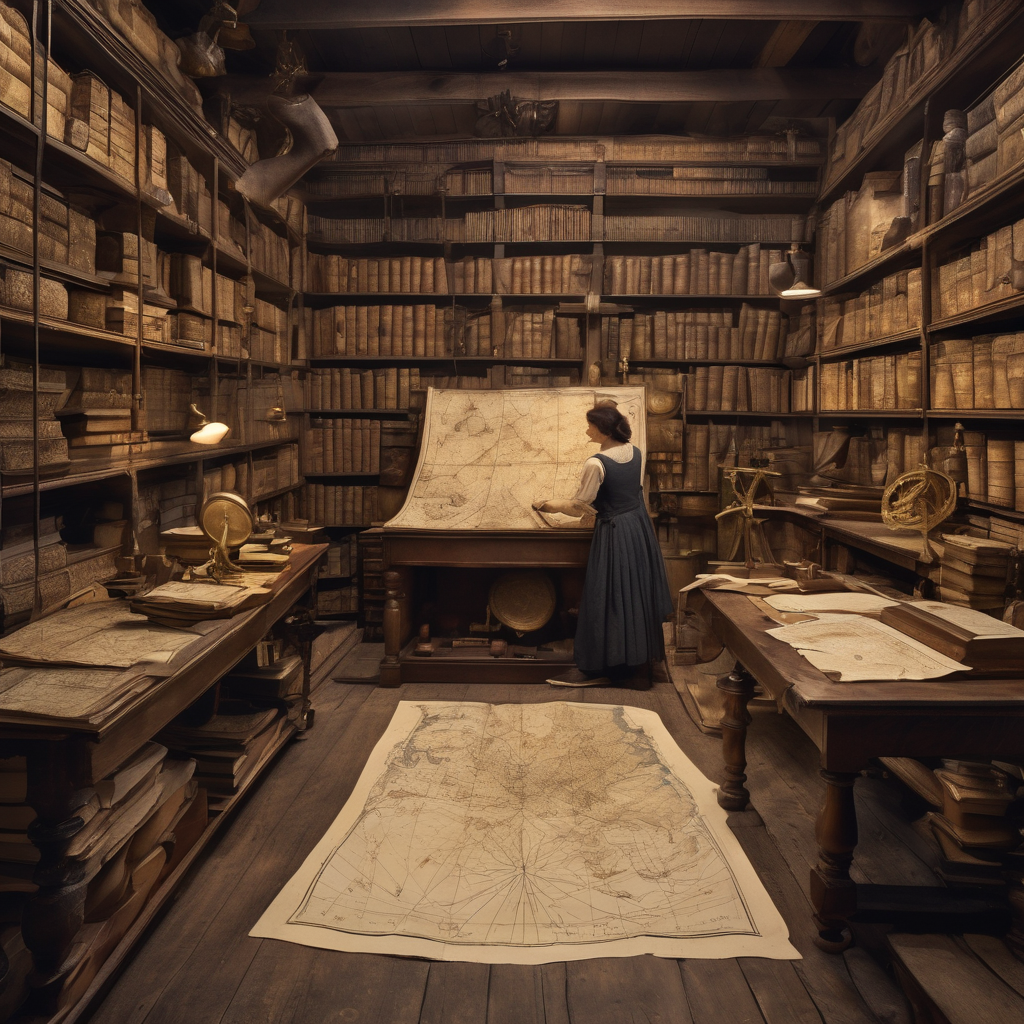The smell of parchment and ink had been Sophia’s lullaby since childhood, drifting up from her father’s workshop below their cramped quarters above the antiquarian map shop. Now, three days after his funeral, she sat surrounded by his life’s work—rolled charts of forgotten kingdoms, hand-drawn coastlines of vanished islands, and star maps that promised navigation to worlds that existed only in dreams.
The lawyer had been clear: the shop’s debts exceeded its assets. Everything would be auctioned within the month unless she could produce the astronomical sum owed to creditors. Sophia had already resigned herself to losing her childhood home when she discovered the hidden compartment behind her father’s desk.
Inside lay a single map unlike any other in his collection. The vellum seemed to shimmer with an inner light, and the ink appeared wet despite obviously being centuries old. Byzantine Greek script flowed along the borders, interspersed with symbols she didn’t recognize. At the map’s heart lay Constantinople in impossible detail—not the Istanbul of today, but the great city as it had been at the height of empire, complete with palaces and districts that historians insisted were merely legend.
Her father’s journal, tucked beneath the map, contained a final entry dated the day before his death: “The Kantakouzenos Map chooses its own inheritors. Sophia will understand what I could never bring myself to do. The path lies in following what shouldn’t exist.”
The next morning, Sophia spread the map across the shop’s main table, weighting its corners with brass astronomical instruments. She’d studied enough of her father’s work to read basic cartographic symbols, but this map defied conventional understanding. Rivers flowed uphill. Streets intersected in geometrically impossible ways. And strangest of all, tiny figures moved along the depicted roads when viewed from the corner of her eye—though they froze into ink marks the moment she looked directly.
A soft chime announced a customer. The woman who entered wore an elegant coat that seemed to shift color between midnight blue and deep purple as she moved. Her ageless face could have belonged to someone thirty or seventy, and her accent carried traces of places Sophia couldn’t identify.
“You’ve found your father’s greatest treasure,” the woman said, approaching the map without invitation. “I am Elena Kantakouzenos. My family has been searching for this for six hundred years.”
Sophia instinctively moved to shield the map. “It’s not for sale.”
Elena smiled. “Of course not. Maps like this aren’t owned—they’re partnered with. Your father understood that, which is why he could never complete the journey it offers.” She gestured to the seemingly living illustrations. “This map doesn’t show Byzantium as it was, but as it could still be—in the spaces between what we call real.”
“That’s impossible.”
“Is it? Look at the eastern quarter, where the Hagia Sophia stands. Do you see the door that shouldn’t exist?”
Sophia leaned closer. Among the map’s impossible architecture, one small doorway pulsed with golden light. As she watched, she could swear she smelled incense and heard distant chanting.
“The empire never truly fell,” Elena continued. “It simply… relocated itself. The last emperor commissioned this map as a key, a way for worthy inheritors to find what was hidden rather than lost. But the journey requires someone who belongs to both worlds—the dusty reality of historical fact and the shimmer of what might still be.”
Sophia’s rational mind rebelled against every word, yet something deeper recognized truth. She thought of her father, forever searching among his maps for something he could never quite name. She thought of the debts crushing down upon her, of losing the only life she’d ever known.
“What would I have to do?”
Elena’s eyes gleamed. “Trust the map. Step through the door it shows you. And remember that the greatest treasures of Byzantium were never gold or jewels, but knowledge itself—the kind of knowledge that could save a small map shop and honor a father’s true legacy.”
Sophia looked down at the map. The golden door pulsed brighter, and for just a moment, she could see through it to marble corridors where robed scholars walked with scrolls under their arms, their faces bright with the joy of discovery. In that instant, she understood that her father had spent his life preparing her not to inherit his debts, but to inherit wonder itself.
She placed her palm flat against the map’s shimmering surface. The parchment felt warm, almost alive.
“Show me,” she whispered.
The map began to glow, and the shop around her started to fade at the edges, replaced by the sound of Byzantine bells calling across centuries.

Leave a Reply